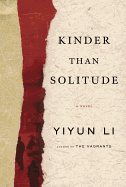
Yiyun Li's second novel, Kinder Than Solitude, reconstructs the intense friendship of three Beijing teenagers in the 1980s and studies how their youthful connection to the poisoning of a young woman still reverberates 20 years later. Boyang, the only member of the trio who resides in China as an adult, manages his life with analytical dispassion while dutifully continuing to visit brain-damaged Shaoai; Moran and Ruyu attempt to quarantine themselves (separately) in American marriages and self-effacing careers. Narrated from the points of view of the three protagonists, Kinder Than Solitude executes a quadruple play: it's an attempted-murder mystery, a soft satire of modern mores across two cultures, a psychological exploration of tragedy's aftermath and, most trenchantly, a vivid re-creation of adolescent aspiration and claustrophobic social dynamics in the era of the Tiananmen Square protests.
The first chapter, set two decades after the poisoning, may introduce more information than a reader can easily process from a cold start, but the second reverts to a 15-year-old Ruyu; from there, Kinder Than Solitude alternates between the teenage and the adult timelines. Li, the recipient of a 2010 MacArthur "genius" fellowship, offers a rare pleasure: astute human characterization. Kinder Than Solitude teems with memorable individuals of all ages whose actions spring from their traits.
In one of the novel's many aphorisms, Li writes, "A secret that never heals makes a person, however close, a stranger, or worse, an intimate, an enemy." The secret that binds Boyang, Ruyu and Moran is presented with so much complex causality that even the reader experiences the contagion of implication. --Holloway McCandless, blogger at Litagogo: A Guide to Free Literary Podcasts

